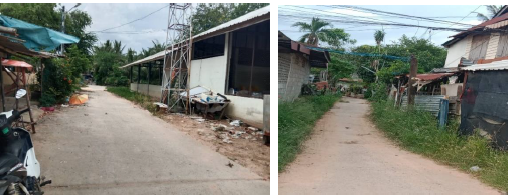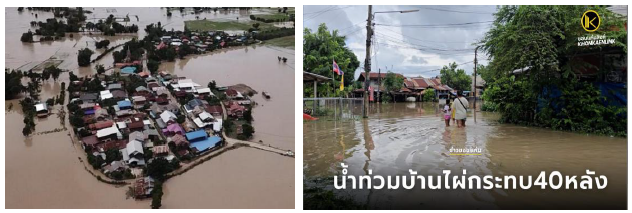From “Forest Land” to Nam Phai: The Land of Happiness
“From forest to Nam Phai, the land of happiness” is a record of a significant transformation that began with the small dream of villagers who longed for a home of their own. Through the power of unity, they came together to reclaim once-abandoned forest land, turning it into a secure and livable community—a model for sustainable and joyful development.

Nam Phai Subdistrict: From Challenges to a Strong Community
Nam Phai Subdistrict is a rural area rich in natural resources but still struggling with structural problems and basic limitations affecting the quality of life in multiple dimensions—economic, social, and environmental.

- Land Tenure: Many villagers had no official land title deeds, preventing access to welfare, development loans, and secure tenure. This undermined household security and long-term planning.
- Water Shortages: Particularly severe in the dry season. Some upland areas lacked efficient water storage and distribution systems, disrupting both daily life and agriculture.
- Transportation: Lack of access roads to farmland made crop transport difficult, especially in the rainy season. Slippery, damaged routes caused crop loss, increased costs, and reduced farmers’ income.
- Economic Vulnerability: Farmers relied on monoculture crops, making them vulnerable to market fluctuations and high costs for fertilizers, pesticides, and labor, while lacking bargaining power.
- Environmental Issues: Lack of proper waste management led to open dumping or burning, polluting air quality—especially during dry-season smog, which affected health, particularly among the elderly, children, and chronically ill.
In short, Nam Phai was grappling with multidimensional challenges requiring integrated collaboration from government, local authorities, academia, and villagers to shape sustainable development that truly met community needs.
From the “Forest Reclamation” Policy to Reclaiming Land Rights
Nam Phai lies within national parks, forest reserves, and wildlife sanctuaries. Historically abandoned, settlements were scattered, with villagers lacking land rights, suffering water shortages, high costs, and poor health from monoculture farming.
In 2011, a devastating landslide destroyed homes, swallowed farmland, and claimed lives. Many had unknowingly farmed in protected areas. Later, the 2014 government’s “Forest Reclamation Policy” led to the seizure of 1,661 rai of farmland in 2015, leaving many families landless. Four villagers were prosecuted, including the husband of Ms. Thongdaeng, one of those affected.
At this dead end, villagers sought unity. In a symbolic meeting, each participant received a corn seed to drop into one of three boxes representing their most urgent need. The overwhelming demand was for land rights.
“At that time, we were cornered and didn’t know what to do. We came up with an idea to build unity by distributing corn seeds for people to drop into boxes showing their needs. That day, most were dropped into the land rights box—showing that regaining land rights was the community’s top priority.” — Thongdaeng Sretnawech
Subsequently, over 300 villagers petitioned the Governor of Uttaradit. This triggered an official survey and mobilization under Section 64 of the Forest Act. As a result, over 1,600 rai of land was returned to villagers—a testament to collective determination and unity.
Repairing Homes, Healing Hearts with Community Power
Although many households lived in fragile houses, some without toilets or with bamboo walls, collective action and CODI’s support made home repairs possible. From adding toilets to fixing leaking roofs, every improvement reflected community strength in building a sustainable quality of life.
From Secure Housing to Land Rights for Livelihoods
The Nam Phai Baan Mankong Rural Housing Project engaged forestry and other agencies to develop agreements:
- Residents could use designated forest areas for housing and farming.
- Encroachment, deforestation, and heavy machinery were strictly prohibited.
- Villagers committed to forest care—restoring greenery, planting fruit trees, creating firebreaks, and maintaining buffer zones.
CODI supported the project with a budget of 12.9 million baht for 200 households.

Strengthening the Local Economy with Cashew Nuts and Creative Agriculture
Economic initiatives included cashew and banana processing groups to increase product value. In partnership with Uttaradit Rajabhat University, the project “Quality Cashew Nut Management Innovation for Strengthening the Local Economy” was launched, covering the entire value chain.
- Subproject 1: Improve cashew nut yield and quality in farmland.
- Subproject 2: Develop draft agricultural product standards (raw cashew nuts) to promote fair trade.
Additional efforts included: promoting integrated agroforestry, organic farming, shade-grown cash crops, certifying 40 GAP-standard cashew farms, developing new products like cashew milk, and preparing for GI certification.
This not only created added value but also laid a foundation for a strong, sustainable, and competitive local economy.

